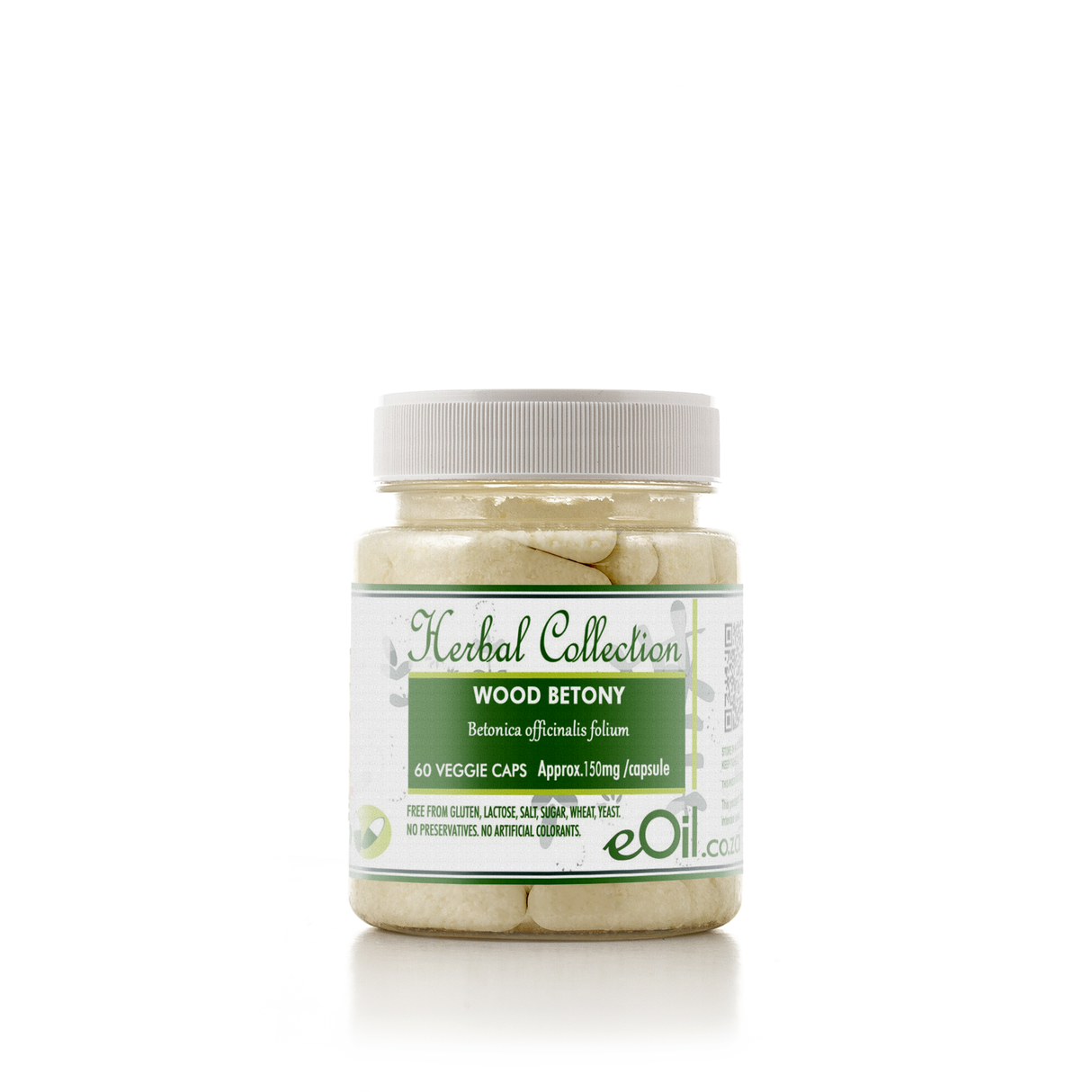Wood betony vegan capsules - Herbal Collection
Wood betony vegan capsules - Herbal Collection is backordered and will ship as soon as it is back in stock.
Description
Description
Betonica officinalis
Woodbetony - 60 capsules - Herbal Collection
Dried wood betony (Stachys officinalis) is a traditional herb with a long history of use in various cultures.
It is known for its earthy aroma and has been traditionally used for its potential benefits.
Wood betony is often prepared as a tea or infusion, and some believe it may offer supportive properties.
For in depth information please check the tabs below
TRADITIONALLY USED FOR
Wood betony, derived from the Stachys officinalis (or Betonica officinalis) plant, is a traditional herbal remedy with various properties and benefits:
- Nervine: Wood betony is known for its calming effect on the nervous system, making it useful for alleviating stress, anxiety, and nervous tension.
- Digestive Aid: Wood betony can help support digestion and alleviate gastrointestinal issues such as indigestion, bloating, and gas.
- Antispasmodic: Wood betony possesses antispasmodic properties that may help reduce muscle spasms, cramps, and tension headaches.
- Astringent: Wood betony acts as an astringent, which can help tighten and tone tissues, making it beneficial for skin health and wound healing.
- Anti-inflammatory: Wood betony has anti-inflammatory properties that may help reduce inflammation and alleviate symptoms associated with inflammatory conditions.
- Respiratory Support: Wood betony has been traditionally used to relieve respiratory issues such as coughs, bronchitis, and asthma.
- Circulatory Tonic: Wood betony is considered a circulatory tonic, as it may help improve blood circulation and reduce the risk of varicose veins.
Note: While wood betony offers numerous benefits, it is essential to use it responsibly and consult a healthcare professional before incorporating it into your routine, especially if you are pregnant, nursing, or have a pre-existing health condition.
INFORMATION
Source : http://www.wikiphyto.org/wiki/Woodbetony
Reference on http://www.wikiphyto.org
Translation in English by Google Translate (go to the page of the source linked | on Chrome cellphones go on the 3 dots on the top right and select translate in your preferred language | on laptop right click your mouse and select option translate when hoovering on the page
plant name
Betony, epiaria officinalis , Swiss tea , beautiful head
International Latin denomination
Stachys officinalis (L.) Trevis. (= Stachys betonica Benth.) = Betonica officinalis L.
botanical family
Lamiaceae
Description and habitat
- Perennial grass with a thick stump, common in France
- Woods, moors or pastures on siliceous soils
- Single rod with square section, up to 50 cm
- Leaves opposite ovate with a heart-shaped base, crenate margin
- Ovoid spike inflorescence by coexistence of storied floral whorls
- Flowers with bilabiate corolla, red, pink or even white
History and tradition
- Formerly very famous
- It was one of the great medieval panaceas for its vulnerary properties
- Vulnerable species or Swiss tea from the 1949 Codex:
- Leaves and tops of wormwood , betony , calamentum , germander , hyssop , ground ivy , oregano , periwinkle , rosemary , sage , scolopendra , scordium , thyme , veronica ; arnica flowers , cat's foot , coltsfoot ; in equal parts
- Its sneeze leaves were sometimes used in tobacco, causing a sneeze and "clearing the brain"
Parts used
- Leaf, root, whole plant
Dosage forms available
- Mother tincture of Betonica officinalis whole plant
Usual dosages
Composition
Main components of the plant
- Tannins
- Lactones of amino alcohols : stachydrin ( amino alcohol from the betaine family )
- Complexe glucosidique
- Lithospermic acid (?)
- Glycosides de phényléthanoïdes : bétonyosides A-F, acétoside, campnéosides II, forsythoside B, leucosceptoside B [1]
- Diterpenes : AD concreteicosides, concreteicolide in the roots [2]
Main components of buds or young shoots
Main components of essential oil
Properties
Plant properties
- Béchique, émolliente, expectorante
- Carminative, cholagogue
- Sternuatoire, émétique
- Hypotensive (complexe glucosidique) [4]
- Vulnerable
- Antioxidant [5]
- A related species, Stachys lavandulifolia Vahl. is anxiolytic [6]
- Lithospermic acid is contraceptive and antihormonal
Bud properties
Properties of essential oil
Indications
Indications of the whole plant (phytotherapy)
- Catarrhal bronchitis
- Cough
- Sinusitis [7] , dental problems [8]
- Gallstones, heartburn, hypertension, migraines and neuralgia (?)
- As an ointment for wounds
Indications of the bud (gemmotherapy)
Specific indications of essential oil (aromatherapy)
Known or suspected mode of action
- Antihormonal properties (?) which would be due to lithospermic acid ( polyphenol having antigonadotropic, antithyrotropic, antiprolactin properties)
Usual formulations
Regulations
- French Pharmacopoeia list A (sheet)
Possible side effects and precautions for use
Bibliographic references
- Go↑ Toshio Miyase, Ryouko Yamamoto, Akira Ueno. Phenylethanoid glycosides from Stachys officinalis. Phytochemistry, Volume 43, Issue 2, September 1996, Pages 475-479
- Go↑ Miyase T. Yamamoto R. Ueno A. Betonicosides A-D and betonicolide, diterpenoids from the roots of Stachys officinalis. Chemical and pharmaceutical bulletin. 1996, vol. 44, no8, pp. 1610-1613 [1]
- Go↑ Vjera Bilusic Vundac, Hartwig W. Pfeifhofer, Adelheid H. Brantner, Zeljan Males, Misko Plazibat. Essential oils of seven Stachys taxa from Croatia. Biochemical Systematics and Ecology, Volume 34, Issue 12, December 2006, Pages 875-881 [2]
- Go↑ UB Ismailoglu, I Saracoglu, US Harput, I Sahin-Erdemli. Effects of phenylpropanoid and iridoid glycosides on free radical-induced impairment of endothelium-dependent relaxation in rat aortic rings. Journal of Ethnopharmacology, Volume 79, Issue 2, February 2002, Pages 193-197 PMID 11801381
- Go↑ Adam Matkowski, Magdalena Piotrowska. Antioxidant and free radical scavenging activities of some medicinal plants from the Lamiaceae. Fitoterapia, Volume 77, Issue 5, July 2006, Pages 346-353
- Go↑ M. Rabbani, S. E. Sajjadi, H. R. Zarei. Anxiolytic effects of Stachys lavandulifolia Vahl on the elevated plus-maze model of anxiety in mice. Journal of Ethnopharmacology, Volume 89, Issues 2-3, December 2003, Pages 271-276
- Go↑ Eric Yarnell, Kathy Abascal, Carol G. Hooper. Chronic Sinusitis. Alternative and Complementary Therapies. February 2003, 9(1): 39-41 [3]
- Go↑ Kathy Abascal, Eric Yarnell. Herbs for Treating Periodontal Disease. Alternative and Complementary Therapies. August 2001, 7(4): 216-220. doi:10.1089/107628001750424544
CAUTION
Store in a cool, dry place, away from light. Keep tightly closed, away from the reach of Children and pets.
Do not exceed the daily dose.
This product is not intended to prevent or cure any form of illness or disease.
If you are pregnant or nursing ; If you have a medical condition or are in the course of medical treatment ; If you are programmed for theater/operation in the near future, please consult your healthcare practitioner before using this product.
This product cannot replace a varied and balanced diet and a healthy lifestyle.
This product has not been evaluated by the SAHPRA for its quality, safety or intended use.
For More Information please check our General Safety Herbal products Page





